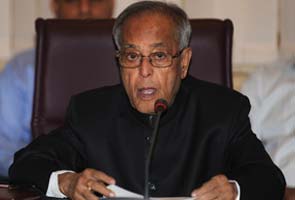ALAPPUZHA, KERALA, Mar 16: India still has a “great distance” to go in ensuring proper health care systems to its teeming population, President Pranab Mukherjee said here.
Addressing a gathering of medical professionals and students, he said the public sector health care system of the country is “limited” and it needs to spread further.
“Despite the progress made in our health care system, we still have great distance to cover. The public sector health service in our country is limited by its reach.
“Many in our population are dependent on the private sector for delivery of health services,” he said while inaugurating the golden jubilee celebrations of the government T D Medical College here.
The medical college established in 1963 has produced over 4,200 doctors during the five decades of its existence.
Delving into the country’s medical care system, Mukherjee, who is on a day-long visit to the state, said it should be such that no one is “denied speciality medical treatment due to high costs”.
“It is burdensome for poor people to access expensive medical treatment and many fall into the trap of poverty on account of that,” he said.
The President added that the quality of health care delivery by some of the health service providers in the country leaves “much to be desired”.
“We must correct this situation by expanding good quality, affordable public sector health care facilities.
“Our public expenditure on health care was 1.04 per cent of GDP during the eleventh five year plan period. This should rise to 2.5 per cent of GDP by the end of the twelfth plan period if we are to augment public health care in the country in a big way,” he said.
He emphasised on the age old proverb of ‘health is wealth’ and said the “well being of a nation is dependent on the well being of its people”.
“Unless the health of the people is secured, the productive potential of the country cannot be realised to the full extent,” he said.
“A sound health care system depends on the three pillars of availability, quality and affordability,” the President said.
Kerala Governor H R Bhardwaj, Chief Minister Oommen Chandy, leaders of the Assembly, state cabinet ministers, Minister for Overseas Indian Affairs Vayalar Ravi and Union Ministers of State K Suresh (Labour and Employment) and K C Venugopal (Civil Aviation) were present during the event.
Mukherjee appreciated Kerala’s role in providing a huge workforce of medical professionals to the country and praised the state for being “proactive in implementing national programmes for control and eradication of diseases”.
“Kerala is a big contributor to the pool of health care professionals, particularly doctors and nurses, in the country… The Kerala model of social development, where the government initiatives are matched by active civic participation, is indeed laudable,” he said.
The President also stressed on the need to have more institutions which provide medical education and training to young professionals.
“There is urgent need for more institutes of learning for imparting medical education. It is gratifying to note that six AIIMS like institutions are to be set up soon.
“It is also necessary to increase the capacity of our existing medical schools and nursing colleges and enhance the standard of education in all of them.
“I am confident that our public sector medical colleges will meet the twin challenge of greater quantity and better quality,” he said.
The mechanism of health insurance must be strengthened, he said, adding that the Rashtriya Swasthya Bima Yojana that gives “beneficiaries cashless in-patient treatment should provide access to comprehensive primary, secondary and tertiary medical care.”
“The benefits of this scheme should touch every one below poverty line,” he said.
A sustainable model of health care with the participation of all stakeholders was the need of the hour.
“We have envisaged infant mortality rate to reduce from 44 per 1,000 live births to 25 by the end of the twelfth plan period and the maternal mortality rate to reduce from 212 per one lakh live births to 100 during this period.
“These targets are within our reach, but for that comprehensive efforts are essential,” he said.
Increasing the density of medical professionals was aimed in the twelfth five year plan.
“There were about 241 medical professionals — physicians, dentists, nurses, pharmacists and other professionals — per one lakh population in 2011-12.
“It is envisaged that this density of medical professionals will increase to 354 by the end of the twelfth five year plan period,” he said.
Mukherjee urged medical experts and major stakeholders in this domain to develop a technology-based “efficient health information system for universal registration of births and deaths, nutritional surveillance and disease surveillance.”
“A sound database should come handy for our policy makers to make timely interventions,” he said.
On the occasion, Governor Bhardwaj said it was “high time” that the health care sector is categorised as a priority one.
The President congratulated T D medical college on the golden jubilee and wished that the institution continues to do pioneering work for medical education in the state and in the country. (PTI)


